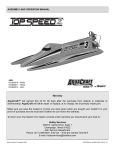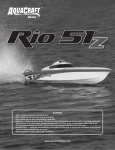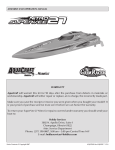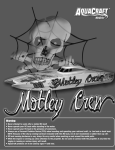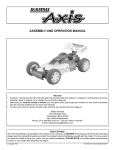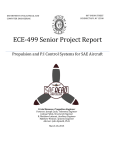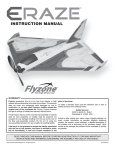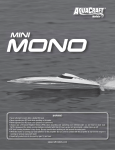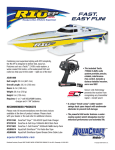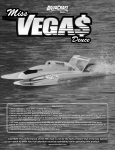Download AquaCraft Top Speed 2 HCAB5011 Specifications
Transcript
™ ™ 2008 and 2009 World Champion! WARNING: • NEVER attempt to swim after a stalled RC boat! • Never operate your RC boat while standing in the water. • Never operate your RC boat in the presence of swimmers. • Always use a Personal Flotation Device (PFD) when boarding and operating your retrieval craft, i.e. Jon boat or duck boat. NOTE: Because of the sharp running hardware included with this RC boat, we do not recommend a rubber blow up raft. • RC boat running hardware is very sharp. Be very careful when working on and around the metal parts. • While the engine is running pay close attention to the propeller. Do not come in contact with the propeller at any time the engine is running or serious injury will result. • AquaCraft products are to be used by ages 14 and over. aquacraftmodels.com INTRODUCTION & DESCRIPTION CHANGES Thank you for purchasing the AquaCraft Top Speed 3 (TS3). We at AquaCraft want the time you spend with your boat to be safe, fun and successful. If for any reason you feel this R/C model is not for you return it to your place of purchase immediately. Your hobby dealer cannot accept returns on any model after final assembly or after your boat has been operated. AquaCraft products are to be used by ages 14 and over. All pictures, descriptions, and specifications found in this instruction manual are subject to change without notice. AquaCraft maintains no responsibility for inadvertent errors in this manual. ITEMS INCLUDED ➧ Pre-Painted Top Speed 3 Hull and Cowl ➧ Radio Box, Fuel Tank and Fuel Tank Mount ➧ Running Hardware ➧ Decals PARTS NEEDED TO COMPLETE YOUR MODEL AND OPTION PARTS RADIO SYSTEM: Most any radio equipment will work quite well in your new boat, but to aid in selection we have provided you with three possible options. OPTION 1: (This option is the least expensive of the three but still has plenty of range and power for tunnel boat racing.) ❏ 1-TACJ0245 Tactic™ 2.4 Radio system less servos ❏ 1-FUTM0031 Futaba® 3003 Standard Servo (Throttle) ❏ 1-FUTM0045 Futaba 3305 High-Torque Standard Servo with Metal Gears (Steering) ❏ 2-FUGP7300 Fuji AA batteries (4 pack) OPTION 2: (This option has a transmitter that has multiple model memory, allowing you to easily grow as your racing program grows.) ❏ 1-FUTK2021 Futaba 3PM-X Radio system less servos ❏ 1-FUTM0031 Futaba 3003 Standard Servo (Throttle) ❏ 1-FUTM0102 Futaba S9402 High-Speed Coreless BB (Steering) ❏ 3-FUGP7300 Fuji AA batteries (4 pack) OPTION 3: (This option costs the most money and is top of the line equipment.) ❏ 1-FUTK4900 Futaba 4PK Radio system less servos ❏ 1-FUTM0031 Futaba 3003 Standard Servo (Throttle) ❏ 1-FUTM0236 S9315 Digital High Torque Servo (Steering) ❏ 1-FUTM1383 Futaba NRT5 5Cell NiCd RX battery 2 ENGINE: ❏ O.S.® 21XM Marine Outboard Engine (OSMG1721) ACCESSORIES NEEDED TO OPERATE YOUR MODEL: ❏ AquaCraft Fuel Line (AQUB6903) ❏ TorqMaster™ Electric Starter (HCAP3200) ❏ 30% Boat Fuel, Quart (AQUP2230) or ❏ 50% Boat Fuel, Quart (AQUP2250) ❏ Hot Shot 2™ Glow Igniter (HCAP2520) ❏ Hand Crank Fuel Pump (HCAP3015) ❏ Fuel Line (AQUB6903) ❏ Fuel Filter (GPMQ4150) ❏ Glow Plug Wrench (GPMP2000) ❏ AquaCraft GrimRacer™ Pro Radio Box Tape (AQUB9514) ❏ AquaCraft GrimRacer Speed Grease (AQUB9500) EXTRAS: #ODOG0309 ❏ O’Donnell™ OD-9 Glow Plug (ODOG0309) or #OSMG2690 ❏ O.S. #6 A3 Glow Plug Hot (OSMG2690) TOOLS NEEDED TO COMPLETE YOUR MODEL: ❏ Boat Stand (see how to make a Boat Stand on page 4) ❏ Setup board (see how to make a setup board on page 4) ❏ Medium CA glue or 12 minute epoxy ❏ #1 “Small” Phillips screwdriver ❏ 1.5mm hex wrench ❏ 2.5mm hex wrench ❏ 4mm nut driver ❏ Pliers ❏ Hand drill ❏ Drill bits, 1/16", 5/64", 1/8" and 9/64" ❏ Silicone sealer ❏ Household cement (like Goop) ❏ Masking tape ❏ Moto Tool with cut off wheel ❏ 6" machinist ruler ❏ Hobby Knife ❏ Scissors ❏ Thread locking compound WARRANTY SERVICE SAFETY PRECAUTIONS AquaCraft will warrant your model for 90 days after the purchase from defects in materials or workmanship of original manufacture. AquaCraft, at their option, will repair or replace at no charge, the incorrectly made part. This warranty does not cover damage caused by crash, abuse, misuse, alteration or accident. To return your boat for service you need to provide proof of purchase, your store receipt or product invoice will suffice. • Never, ever, attempt to swim after a stalled RC boat. DO NOT get in the water for any reason to retrieve your boat. Your TS3 has flotation added to the interior of the hull and the cowl. They will not sink. To aid you in retrieving a stalled RC boat you can use a fishing reel with a tennis ball tied to the end of the line. Or better yet, get yourself a small Jon boat so you can row out and pick up your boat. Remember to use a PFD any time you enter your retrieval craft. IN NO EVENT SHALL THE PURCHASER BE ENTITLED TO ANY INCIDENTAL, SPECIAL, INDIRECT OR CONSEQUENTIAL DAMAGES, WHETHER RESULTING FROM THE USE, MISUSE OR INABILITY TO USE THE PRODUCT OR FROM DEFECTS IN THE PRODUCT. This warranty gives you specific legal rights and you may also have other rights, which vary from state to state. Outside USA and Canada, contact local importer for warranty information. Hobby Services 3002 N. Apollo Drive, Suite 1 Champaign, Illinois 61822 Attn: Service Department Phone: (217) 398-0007 9:00 am - 5:00 pm Central Time M-F E-mail: [email protected] FEATURES & SPECIFICATIONS BOAT SPECIFICATIONS: Hull Length: 30" (765mm) Overall Length: 36" (915mm) Width: 10.5" (265mm) Height: 6" (154mm) Weight (less fuel): 5 lbs (2.3 kg) • AquaCraft products are to be used by ages 14 and over. • Do not touch the propeller anytime the engine is running. Pay equally close attention to items such as loose clothing, shirtsleeves, ties, scarves, long hair or anything that may become entangled in the spinning prop. If your fingers, hands, etc. come in contact with the spinning propeller, you may be severely injured. • The speed and mass of this boat can inflict property damage and severe personal injury if a collision occurs. Never run this boat in the presence of swimmers or where the possibility of collision with people or property exists. • Glow engines produce heat. Do not touch any part of your engine until it has cooled. • This boat is controlled by radio signals, which are susceptible to possible interference from other R/C transmitters, paging systems, or other electrical noise. Before turning your radio transmitter and receiver on, make sure no one else in the area is operating a radio on the same frequency (channel). • If your TS3 should happen to stall, water currents will slowly carry it to shore. The bad news is that the boat could be carried to the opposite shore. When surveying areas to run your model, keep variables in mind such as wind direction, size of the lake, etc. It is not advisable to run R/C boats on any free-flowing bodies of water such as creeks or rivers. BOAT FEATURES: Race-winning heritage Fiberglass construction High gloss, fuel-resistant painted finish Water-resistant radio box 8 oz molded plastic fuel tank 3 BOAT STAND You are going to want to build the boat stand as soon as you can. It makes assembling the boat easier and the stand can be used as the starting stand for the boat as well. There are a lot of ways to build a boat stand, but we would like to show you one way that is inexpensive and durable. PARTS YOU WILL NEED: ❏ (8) 1" PVC T’s ❏ (2) Lengths of 1" PVC piping 16" long ❏ 2 – Lengths of 1" PVC piping 11-1/2" long ❏ 4 – Lengths of 1" PVC piping 2" long ❏ 2 – Lengths of 1" pipe insulation 11-1/2" long ❏ PVC cement (like the tube kind for boat stand building) Pre-assemble the parts without using any cement first. Then disassemble and reassemble using the cement. Assembly is easy, as the long 16" lengths of PVC piping run the length of the boat and the shorter 11-1/2" lengths side-to-side. Glue the Ts to the ends of the tubing, making sure the Ts are parallel to each other. Join the completed parts together using the short 2" lengths of piping. You will have to work fast as the cement sets the parts almost instantly. SETUP BOARD Your setup board is going to be a very important tool in getting your boat to perform at its best. Here is a simple how to: Using MDF or common shelf board (do not use plywood or a media with a grain), cut the board 25" long and 11" wide. Place a slot 1/2" wide on one end of the board, aligning it in the center of the 11" width. The nice thing about this setup board is it fits between the Ts of the boat stand you just made, making boat setup even easier by keeping the skeg of the engine a safe distance from the table top. GrimRacer says: It’s a good idea to place a hole in one end of the setup board and hang it from a hook or nail for storage. This will help keep the setup board true. 4 PREPARING THE ENGINE FOR THIS STEP YOU ARE GOING TO NEED: ➧ #1 Phillips screwdriver ➧ 4mm nut driver ➧ Thread locking compound Prepare the engine by installing the metal ball links to the engine tiller arm. You are going to want to install the ball links in the inner most holes of the tiller arm. You might have to enlarge the holes of the aluminum tiller arm to allow the screw to pass through. It’s a good idea to use a little thread locker on the screw to help secure the parts. Now is also a good time to check the direction of the mount plate to make sure it’s positioned with the pivot boss near the bottom. You can also install the throttle cable clamp at this time. FOR THIS STEP YOU ARE GOING TO NEED: ➧ Scissors or hobby knife ➧ Hand drill with both 1/8" and 9/64" drill bits ➧ 2.5mm hex wrench ➧ Masking tape Cut engine mounting template from the back of this manual. Center the template on the transom and tape in place. Use a 1/8" drill bit and drill the center marks on the template. Remove the template and enlarge the holes by re-drilling with a 9/64" drill bit. 5 Slip the metal backing plate into the opening in the back of the boat. You will have to rotate it 90° to align the screw holes. Attach the engine to the boat using the 3mm bolts and washers supplied in the kit. Don’t worry about setting the engine height at this time as we will get to that during the “setup” part of the manual. FOR THIS STEP YOU ARE GOING TO NEED: ➧ Medium CA glue or 12 minute epoxy ➧ Hand drill with 1/16” drill bit ➧#1 Phillips screwdriver Glue the fuel tank tray together. Waterproof the tray by applying a coat of epoxy. 6 Center the tray on the back tank platform. Using a 1/16” drill bit, pre-drill the mounting holes. Screw the tray in place using the provided 2mm wood screws. Install the fuel tank to the mount using the supplied O rings. 7 RADIO BOX ASSEMBLY FOR THIS STEP YOU ARE GOING TO NEED: ➧ Medium CA glue or 12 minute Epoxy ➧ #1 Phillips screwdriver ➧ 1.5mm hex wrench ➧ Moto tool with cut off wheel ➧ Hobby knife ➧ Household cement or silicone sealer ➧ Pliers ➧ Hand drill with 1/16" and 5/64" drill bits With the switch mounting feature towards the starboard side (right side of the box when viewed from behind), glue the servo tray onto the standoffs inside the radio box. Install the two waterproof boot mounting plastics by sliding them in from the inside of the box. Use medium CA to glue them in place. 8 Use a 5/64" drill bit to enlarge the hole in the switch for the ON/OFF switch pushrod. Slip the switch (ON facing to the front of the boat) through the throttle servo opening. Place the switch plate in place. Slide the ON/OFF pushrod in the box, positioning the hook in the end of the wire through the switch. It is best to install the wire through the hole in the switch from the box side so it cannot fall out during use. 9 Screw the switch in place; do not overtighten the screws. Install and glue in the small rubber rod seal by slipping it over the ON/OFF wire and gluing it in place. Install the servos next. The front opening is for the throttle servo and the rear for the steering servo. Install the servos so the output shafts are towards the front of the radio box. GrimRacer Says: The metal eyelets that come with the servos are inserted from the bottom side of the servo; this way the rubber grommet is captured by the flange of the eyelet and the built-in washer of the servo screw. This provides the best vibration protection and strongest mounting for the servo. Remove the servo arms from the servo and clip the spokes as shown in the picture. 10 On the dual servo arm only, use a 5/64" drill bit to enlarge the holes furthest out on the servo arm spokes. Do not enlarge the hole on the single servo arm. Here are the parts we need for the next step. Slip the 90° end of the short steering pushrod into the servo arm from the bottom. Add the pushrod keeper and snap it into place. Repeat with the other side to complete the assembly 11 Slide the completed steering servo arm into the radio box from the inside. The rods protrude through the pushrod rubber seal mounts. Slip the rubber seals over the rods. Be careful not to puncture the seals, and glue them in place. This is what the radio box looks like thus far. 12 Install the screw lock connector onto the servo arm with the one remaining spoke. Slip it onto the servo for safe keeping. At this time it’s a good idea to loosely install the servo arm screws so as not to lose them. Next we are going to install the throttle cable. Begin by cutting the white outer housing to 17-1/4" (438mm) long. Next take the remaining small rod seal and remove half of the pointed end with a sharp knife. Slip the outer housing through the seal, positioning it about 2-1/2" (64mm) from the opposite end of the housing. Glue the seal in the radio box, being careful not to get any glue on the white outer housing. We are going to adjust the position and glue the housing to the seal later in the setup portion of the manual. 13 Although not necessary, we recommend tack gluing the radio box into the boat with a few small dabs of household cement or silicone sealer. Install the steering rods onto the engine by snapping the ball link over the metal ball. Slip the lock collars over the long rods and then back over the short rods protruding from the radio box. Snug the lock collars in place. We will make final adjustments to the steering rods in the setup part of the manual. Slip the white outer housing in the clamping portion of the cable clamp and snug the other housing in place. If you find the cable is not held well, you can carefully sand some of the thickness of the upper portion of the clamp to allow better clamping. (Do not overtighten the clamp screw). 14 Using a moto-tool and cut off wheel, cut the stainless throttle cable 20-3/4" (527mm) long. It’s best to place a short length of masking tape over the cable and place the mark on the tape. Cut the mark with the tape in place. Slip the short length of fuel tubing over the cable and up to the metal clevis. Next slide the cable into the white outer housing; as you do this, get ready to guide the cable through the screw lock connector (do not tighten the connector). Attach the metal clevis to the throttle arm of the engine and slip the silicone tubing over the metal clevis. 15 Next we are going to install the ON/OFF pushrod guide. Slip the guide over the pushrod and position it as shown in the picture. Using a 1/16" drill pre-drill a pilot hole for the 2mm wood screw. Screw the guide in place. Next, using a set of pliers, put a 90° bend in the end of the rod. 16 If your receiver has an external antenna you can use the include antenna to extend it from the radio box. Drill a 1/4" hole approximately 1" from one end of the radio box lid and install the antenna using a dab of silicone between the hole and the base mount. GrimRacer Says: If you are using a 2.4GHz radio system you can shorten the antenna tube to 5" long. Do not drill a hole in the top of the cowl but rather allow the antenna to gently bend under the cowl for a neat and clean look. Glue the plastic washers on the cowl. Use a small amount of CA to hold them in place. 17 FINAL CHECKS AND SETUP Position the lower unit into the slot on the set up board. Using a small machinist rule (you can get one at your local home store), adjust the engine so the distance between the boat stand and the bottom of the cavitation plate are 30mm at the front and 28mm at the back. This will get you close in both the height and tilt for your first test runs. Having completed this, remove one engine mount bolt at a time and place some silicone sealer on the bolt and re-install it. Do this with all 4 engine mount bolts. Place the provided foam into the bottom of the radio box and insert the receiver battery pack. Place the receiver in the box as well. Do your best to place the receiver so as not to stress the servo plugs. 18 Detach the servo arms from the top of the servos and turn the radio system on. Adjust the steering arm to center and the throttle arm to the position shown in the photo and re-install the arms and servo arm screws. Check the direction of both the steering and throttle movement. NOTE: The throttle arm will move forward (front of boat) to open the carburetor. Adjust the lock collar on the steering arms so the engine is centered with the steering wheel in the center position. Tighten the lock collars. With the metal clevis attached to the throttle arm, make sure you are getting a full range of motion. GrimRacer Says: Adjusting the throttle can be a tad more difficult so please follow along closely. IMPORTANT: After you have the throttle movement adjusted, you are going to want to glue the white outer cable housing to the rubber seal as it exits the radio box. The two must be secure to maintain the throttle adjustment. Make sure the carburetor barrel can fully open as well as fully close.NOTE: If you are not getting a full range of motion you might need to loosen the set screw (1.5mm hex wrench) on the carburetor arm and reposition the arm on the barrel of the carburetor. 19 Squeeze the throttle trigger on the transmitter as well as push the throttle barrel into the full throttle position. Snug the set screw on the screw lock connector. Carburetor Closed Release the throttle trigger and the carburetor barrel should go to high idle. Carburetor Partially Open (Idle) Push the throttle trigger forward and the carburetor barrel should FULLY close. Make any necessary small adjustments to make sure that the barrel FULLY closes. Carburetor Fully Open Hook up your fuel and pressure line using the picture for reference. The use of a fuel filter is not required but is recommended for the first few runs. 20 STARTING AND OPERATION CARE AND MAINTENANCE Check and adjust the high-speed needle on your engine for a safe break in setting (2 turns out for the OS XM Outboard Engine) The prop that is supplied with the OS engine will operate the boat just fine but most boaters use metal props as they provide better handling as well as speed and power. 1. Using a hand or electric fuel pump (hand crank is recommended) fill the fuel tank through the line that attaches to the carburetor. 2. Turn the transmitter on and then the receiver, in that order. 3. Attach the hand held electric starter to a 12V battery and choke the engine by placing your thumb over the barrel of the carburetor. Turn (Crank) the engine over with the starter 3 or 4 times in short 2 second bursts. 4. Install the glow igniter and crank the engine. It should start in less than 10 seconds. If it takes longer than that, re-prime the engine by removing the igniter and re-choking the engine. Repeat this if needed until you have the engine running. GrimRacer Says: It is VERY important to NEVER run the engine with the carburetor fully open with no load on the propeller. The engine can, however, sustain high idle for a minute or two and not be damaged. Bottom line, you are going to want to launch the boat into the water as soon as practical. 5. After the engine is running, launch the boat, applying a little more throttle before the boat touches the water. Drive the boat straight way from you at around half throttle to check the steering center. If needed, adjust the steering trim on your transmitter for straight and true tracking. ➧ Your Top Speed 3 can turn either left or right quite well but due to prop torque the boat turns best to the right (Clockwise). You can start breaking the engine in by making large, right-hand, oval shaped circuits. Throttle up and down during the run to keep the engine running and to load the engine throughout the throttle range. Before the boat runs out of fuel (about 4 minutes), bring in the boat and allow the engine to fully cool. Repeat the same break-in run one more time before we start to lean down the engine for the final break-in runs. ➧ When you’re ready to bring the boat in, drive it parallel to shore and push back on the trigger to stop the engine. Never bring your boat to shore by driving it straight at you. Always drive parallel to shore, stop the engine and then retrieve the boat. This way if your engine does not stop you can still go around and make another attempt. ➧ Finish breaking in the engine per the engine manufacturer’s recommendations. ➧ If you should happen to flip your TS3, you are going to need to remove any water that might have entered the engine. We recommend removing the glow plug and turning the engine over a few times by hand to remove water. After most of the water has been removed, leave the glow plug out and turn the engine over with the electric starter expelling the rest of the water.. Make sure you hold a rag over the glow plug hole. NOTE: Be careful to keep your rag and fingers away from the spinning prop. Re-install the glow plug and start the engine. It is best to start the engine after you have flipped the boat to make sure ALL THE WATER IS OUT OF THE ENGINE. It is also a good idea to inspect the radio box to make sure no water entered the radio compartment. If you should happen to drip or spill fuel on the finish of your TS3, carefully wipe it off as soon as you can. Some fuels, especially high nitro fuels and special oil additives can damage your boats finish. After you’re done boating for the day, you are going to want to add some after-run oil to the engine to protect the internal parts. We recommend removing the glow plug, opening the carburetor all the way, and placing 10 to 12 drops of after-run oil down the barrel of the carburetor. Place a rag over the glow plug hole and turn the engine over with the electric starter. Repeat this step a least one more time to make sure the inside of the engine is fully coated. Replace the plug and wipe the boat down with cleaner. It is also a good idea to open the radio box and unplug the battery from the switch harness. Leave the lid off the radio box overnight to make sure any water that might have entered can evaporate. Clean the exterior of the boat and check over the mounting hardware. HULL TUNING TIPS PERFORMANCE PROPS WORTH NOTING: AquaCraft GrimRacer 40x52/3 Metal Prop AQUB9720 AquaCraft GrimRacer 40x53 Metal Prop AQUB9715 MAJOR TUNING AREAS OF YOUR TS3: ➧ Propeller Shaft (Stub Shaft) Height ➧ Propeller Shaft (Stub Shaft) Angle ➧ Hinge Pin Angle ➧ Center of Gravity (CG) ➧ Propeller ➧ Rudder Deflection Propeller Shaft (Stub Shaft) Height: To simplify, what we are trying to do with propeller shaft height is to “raise the propeller to a height that gives us the greatest speed with the least loss in stability”. Let’s expand on this. To measure the height of the shaft most racers use a setup board. A typical tunnel hull setup board can be a simple piece of shelf board with a slot cut into on end so the user can reference the height of the prop to the bottom riding surface of the sponsons. Adjusting the shaft height plays a huge part in the speed as well as the handling of the boat. Typically, adjusting the propeller higher 21 makes the boat run faster but at a greater risk of blowing the boat off the water (flipping it over backwards). It also can cause loss of steering in the corners if set too high. Lowering the shaft has the opposite effect and makes the boat more stable but can slow the boat considerably. It is also important to note that having the shaft too low can cause the boat to stuff or tuck under going around the corner. Setting the shaft (prop height) is a very important part of tuning your boat. It is also good to note that even 1/16" higher or lower can make or break a good running tunnel boat. Propeller Shaft Angle: Changing the propeller shaft angle causes the bow of the boat to either run higher or lower depending on the angle. What we are trying to accomplish by changing the shaft angle is to loosen up the boat on the water to make it go as fast as possible More positive (+) shaft angle lifts the bow, causing the boat’s tunnel to capture more air, hence less drag and more speed. The risk of having too much positive shaft angle is the possibility of blowing the boat off the water. Too much negative (–) and the boat will run too wet. Typical modern RC tunnel boats run with about 1/2° of negative (–) shaft angle. Hinge Pin Angle: (shimming required) Not all outboard engine mounting systems allow you to change the hinge pin angle separately from the stub shaft angle. It is worth noting, however, that outboard engines that do have a distinct advantage over the ones that don’t. Let me explain. When the servo swings your engine left or right, the stub shaft follows the arc that the hinge pin has set for it. If you have a positive hinge pin angle your stub shaft swings in a positive, neutral, positive motion ( + 0 + ). If your hinge pin angle is set negative, your stub shaft swings in a negative, neutral, negative motion ( – 0 – ). It’s important to note this as the more positive angle the hinge is set at, the higher the bow raises in the corners and the opposite regarding negative pin angle. These can be a huge tuning advantage for the way you drive. To adjust the hinge pin angle you must shim either the top or the bottom of the engine mount plate from the transom. boat can become an instant winner just by using the right propeller. As a rule of thumb, non-lifting propellers are best-suited for your tunnel hull. Some lifting propellers can work but typically need to be “re-worked” to work well on a Tunnel Hull. For the best overall performance stick with a low lift propeller like the AquaCraft GrimRacer 40X53 or AquaCraft GrimRacer 40X52/3. Testing your propeller is best done with a stopwatch. The most important reading is the time the boat takes to go from buoy one (1) to buoy three (3) IMPBA and buoys one (1) through five (5) NAMBA. Second most important time to capture is over all lap speed. Your boat may sound or look faster with a prop change, but don’t let that fool you. Course timing is the best way to determine what if any changes your prop change as made. Rudder Deflection: Your TS3 needs very little rudder deflection to make it around a corner. Obviously your boat will turn tighter with more rudder deflection but the truth is this can upset the boat in the corners. It is best to have just enough rudder deflection to make a nice sweeping corner PLUS just a tad tighter. To set the amount of rudder deflection, run your boat on the race course and half throttle. Adjust the steering dual rate until the boat makes a nice sweeping corner a few feet off the buoys. Next: Run the boat at top speed (remember to lift off the throttle just a little going into the corner) and drive the course. Add in more dual rate until the boat runs the course smooth and fast. Give a few more clicks on the dual rate adjustment. The extra movement might be needed to get you out of danger in the middle of a race. TOP SPEED 3 BASIC SETUP PARAMETERS You are going to want to avoid engine mounts that set the hinge pin past the back of the sponsons. Having the pin in front of the sponson we call under steer, and behind the back of the sponsons over steer. The TS3 likes the pin in the under steer position. Center Of Gravity (CG): The center of gravity “balance” of your boat is just as important as other adjustments you make. Adding or removing weight from the front of the boat ultimately decides the stability of the boat as it flies over the top of the water. The further forward you have the CG, the more speed the hull can handle, but like other adjustments to your boat comes with a price. As a model tunnel boat operates the boat’s ride can become disrupted. Any “acting forces” i.e. wind, waves, drag and or acceleration/deceleration can cause the boat to lose its balance. A properly set CG gives you the best overall balance regarding all those changing conditions. Propeller: First and foremost you need to balance or use a balanced propeller. Not only will this provide the best performance but it is necessary to avoid damaging your engine. You can learn more about how to balance your propeller at www.aquacraftmodels.com The propeller is probably the most important aspect of how fast your boat goes and/or how well it handles. A poor handing, slow 22 ENGINE HEIGHT PROPELLER THRUST ANGLE HINGE PIN ANGLE C.G. RANGE PROP RUDDER DEFLECTION .200" Center of the prop shaft to the bottom of the sponsons .5° Negative Parallel to the transom 7.5" (27%) to 8.6" (31%) from the back of the sponsons AQUB9720 – 40X52/3 1-3/4" left 1-3/4" right DRIVING AND RACING TIPS FROM 12-TIME NATIONAL & WORLD RACING CHAMPION MIKE “GRIMRACER” ZABOROWSKI GrimRacer Says: Don’t just drive your TS3 around, drive your TS3 around something! To reach the full potential this boat has to offer, you need to get it on the water running around the race course. Running your boat on the race course allows you to build depth perception as well as get to know the needs of the boat. ➧ The TS3 responds best if you drive it as if you were driving a car or any other type of wheeled vehicle. Your lap times will go down if you lift off the throttle and set the boat as you enter the corner and accelerate out. Driving “white knuckled” you will likely not be paying attention to your entry point, losing valuable seconds off your lap time. ➧ If the pond you test at has an elevated driver’s platform, make sure you stand on it even during testing. Also stand in multiple locations. This way if you do not get your favorite spot on race day, you will not be surprised by what you experience. It is also good to take a quick look at the water and race course before you launch the boat for your heat. If you see a buoy out of place or an obstacle in the water, it’s best to identify it before you launch the boat. ➧ Starting and launching the boat later in clock time is far better than starting and launching at the beginning. If your clock time is 2:30 like most, be warned, if you go out early you are adding to the seconds your boat can get into trouble. During the race it’s best to be on the water ONLY as long as you need to be. ➧ Also have your caller show you the back of the boat before he or she launches it. Move your rudder back and forth and make SURE it is working before he or she launches the boat. ORDERING REPLACEMENT PARTS To order replacement parts for the AquaCraft TS3 use the order numbers in the replacement parts list that follows. Replacement parts can be purchased from your local hobby shop or by mail order. If you need assistance locating a dealer to purchase parts, visit www.aquacraft.com and click on “Where to buy”. If you are missing parts, contact Hobbico Product Support at: Phone: 217.398.8970 Fax: 217.398.7721 E-mail: [email protected] REPLACEMNET PART NUMBERS AQUB0007 ......TS3 Tunnel Hull, Orange AQUB0008 ......TS3 Tunnel Hull, Yellow AQUB0009 ......TS3 Tunnel Hull, Red AQUB0010 ......TS3 Tunnel Hull, White AQUB9005 ......Throttle Cable Outboard 36" with Pushrod Tube AQUB9782 ......Steering Linkages AQUB9047 ......Transom Cover AQUB6897 ......Fuel Tank Mount AQUB6229 ......Cowl Orange AQUB6230 ......Cowl Red AQUB6231 ......Cowl Yellow AQUB6232 ......Cowl White AQUB6330 ......Decal Sheet AQUB7899 ......Engine Mount Plate, Aluminum AQUB8602 ......Radio Box with Lid, Servo Tray AQUB9506 ......Rubber Hull Plugs AQUB9535 ......GrimRacer Fuel Tank AQUB6899 ......O-Rings for Fuel Tank Mount AQUB7802 ......L-Link Pushrod Connector AQUB9503 ......Radio Box Seal Boots AQUB9537 ......GrimRacer Antenna Mount AQUB9505 ......Antenna Exit Boot Seals AQUB9509 ......Foam Pad NATIONAL ORGANIZATIONS & ON-LINE HELP Transom Top www.impba.net www.namba.com www.aquacraftmodels.com OS Max 21 www.futaba-rc.com www.osengines.com www.odonnellracing.com www.intlwaters.com www.rcuniverse.com www.rcgroups.com C L www.metimeliverc.com Transom Bottom 23 GRIMRACER HIGH-PERFORMANCE METAL PROPELLERS Give your Top Speed 3 an added burst of speed—as easily as bolting on a high-quality copper-beryllium-titanium GrimRacer metal prop! Racer-designed and USA-made, these are the most accurately cast metal props available. Ultra-clean casting and true center-bore hubs place each prop near its balance point right out of the package. You can fine-tune them using less effort than stainless steel props require—and they hold their shape better for balancing, sharpening, and changing pitch. Stock # AQUB9720 AQUB9715 Description 40 x 52/3 40 x 53 Type 3-Blade 2-Blade Diameter 40mm 40mm Pitch 52mm 53mm Bore 3/16" 3/16" Precision cast from Copper-Beryllium-Titanium! GRIMRACER PRECISION PROP BALANCER To maximize performance—and minimize damage to on-board electronics and parts—balance your props with the GrimRacer Precision Prop Balancer. It’s easy to use. Three thumb screws provide perfect level adjustment, and a precise bubble level is built into the one-piece extruded aluminum base. The balancer includes balancing shafts for 1/8" (3.2mm), 3/16" (4.8mm) and 1/4" (6.4mm) bore prop hubs. Propeller not included. AQUB9575 AQUB0007-0010 Mnl © 2010 Hobbico®, Inc.
























